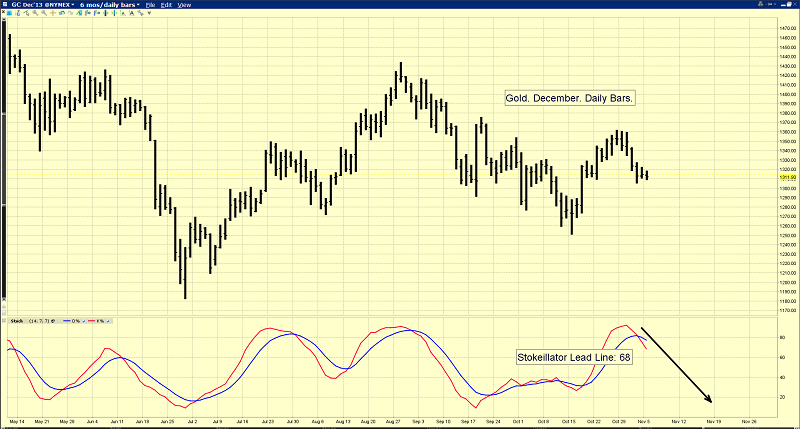Gold, Tapering, & The Middle Class

Historically, gold futures prices often make an intermediate trend bottom around mid-November. This price chart from Dimitri Speck provides a good picture of average seasonal price action.
Arguably, Indian festival buying is the main reason that gold tends to bottom in this November time frame. Unfortunately, recent Indian government restrictions have reduced Indian gold imports dramatically, so seasonal pattern traders should exercise some caution in how they approach the gold market this year.
That's the daily gold chart, and you can see that my stokeillator (14,7,7 Stochastics series) is flashing a sell signal, with the lead line fairly high at about 68.
If gold were to decline for another week or so, the stokeillator would likely come down to an area where it could signal a gold price rally, and that would fit with the price action suggested by the seasonal chart.
That's a longer term look at the daily gold chart. Gold has been trading in a rough sideways pattern for many months, and I believe that “show time” is approaching now.
If gold declines to $1249, I believe that large hedge fund selling and shorting will occur, creating a strong decline that could take the price down to $1123.
On the upside, if gold can rally to $1435, that should attract sizable buying, and a target zone of $1680 - $1710 would come into play.
Note the small inverse head and shoulders bottom pattern that I've highlighted. The US government will release the latest jobs report numbers on Friday. Gold often declines in the week leading up to the report, and then surges higher in the days following it.
My suggestion is to cheer for the head and shoulders pattern to work with the jobs report, to start a rally towards $1435.
From the current price area of about $1312, $1435 is further away than $1249 is, but most gold investors are good at facing adversity.
As “show time” approaches, investors who are nervous should buy put options, rather than just hoping that the next trending move is to the upside.
Gamblers should buy both put options and call options. When a big price movement occurs, option prices can increase more than 100%, enabling the options buyer to beat the options writer, regardless of the direction of the move.
While physical gold buyers in countries like Saudi Arabia are active, some Chinese mining industry officials are forecasting that Chinese imports will drop back to what they call “normal” levels, of less than 1000 tons for 2014.
The decline in Indian imports has been gigantic. I'm forecasting that imports will resume again in the summer of 2014. Clearly, some patience is required.
Many gold analysts may have severely underestimated the amount of money printing that the reserve currency of the world can withstand.
That underestimation is probably why so many analysts constantly predict an imminent parabolic move in the gold price, and an imminent obliteration of the US dollar. In reality, there are very few moments in time when fundamental, cyclical, and technical forces come together to create the “perfect storm” that is needed to produce a gold price parabola. In America, I don't believe that any configuration of parabolic forces in the gold market is in place now. A parabolic set-up was in place until Lehman went bankrupt, and the US Treasury allowed banks to legally mark trillions of dollars of OTC derivatives to model pricing.
That being said, I don't think enough attention is being paid to the money printing that is occurring at Japan's central bank.
Japan is number three economy in the world, and the emergence of inflation in Japan is probably coming much sooner than most analysts think. That inflation would likely be “exported” to China and India. In turn, those nations would export it to America, and other Western nations.
The first half of 2014 could be a tough one for most of the world's gold investors. By the second half of the year, I think that Indian buyers coming back will combine with the emergence of cost push inflation in Japan, to create a strongly bullish tone in the gold market.
Internal inflationary forces in the US economy tend to occur during the later stages of an economic upswing. The US central bank believes in an 8 year business cycle, and the last one peaked in 2007. By mid-2014, the current cycle will be very mature, and prone to inflationary pressures.
I expect to see major bank economists become much more bearish about the US economy in the summer of 2014, based on the maturing business cycle. That's like going to weigh on the amount of tapering the Fed will engage in. Gold investors probably have little to fear from modest tapering.
Mining companies are cutting on production, and scaling back their exploration projects. That's going to affect the supply/demand balance of the gold market.
I have no long term worries about gold stocks, mainly because of the relentless growth of the middle class of Chindia (China and India). Over the next 10 -15 years, I expect the Chindian middle class to almost triple in size, from about 550 million people now, to about 1.4 billion, and almost all of them should be keen to buy gold. As that happens, the American super-crisis should fade as a gold price driver, except for brief moments of time during economic cycle extremes. I think the growth of the Chindian middle class (and in particular, the enormous growth of the upper middle class) will create a more stable gold market with an upwards price bias, for many decades to come. Their growing involvement in the gold market should create much higher prices, and solid dividend payments for gold stock investors.
The gold community is very tough, and I'd like to shed some light on why so many emotionally strong gold stock owners may have found themselves emotionally “broken” over the past few years. Most investors look at their portfolios and say, “It's the drawdowns!”. I disagree. You are viewing the weekly GDX chart. It's not just the drawdowns, but the lack of rallies that creates emotional despair amongst gold stock investors. I think that situation will change now that gold stocks are chopping production. They are becoming “lean and mean” entities rather than bloated hedgers. Please see above chart, for another view of the GDX weekly chart. Note the phenomenal volume, and the powerful stokeillator action. The biggest rally in gold stocks of the past three years, may be almost here!
********
Special Offer For Gold-Eagle readers: Send me an Email to [email protected] and I’ll send you my free “Oil And The Dow!” report. What does the falling oil price indicate about the potential for a US stock market crash in January of 2014, and what does that mean for gold? I show you how I'm playing this scenario.
Note: We are privacy oriented. We accept cheques. And credit cards thru PayPal only on our website. For your protection. We don’t see your credit card information. Only PayPal does. They pay us. Minus their fee. PayPal is a highly reputable company. Owned by Ebay. With about 160 million accounts worldwide.
Email: [email protected]
Rate Sheet (us funds):
Lifetime: $799
2yr: $269 (over 500 issues)
1yr: $169 (over 250 issues)
6 mths: $99 (over 125 issues)
To pay by cheque, make cheque payable to “Stewart Thomson”
Mail to:
Stewart Thomson / 1276 Lakeview Drive / Oakville, Ontario L6H 2M8 Canada
Stewart Thomson is a retired Merrill Lynch broker. Stewart writes the Graceland Updates daily between 4am-7am. They are sent out around 8am-9am. The newsletter is attractively priced and the format is a unique numbered point form. Giving clarity of each point and saving valuable reading time.
Risks, Disclaimers, Legal
Stewart Thomson is no longer an investment advisor. The information provided by Stewart and Graceland Updates is for general information purposes only. Before taking any action on any investment, it is imperative that you consult with multiple properly licensed, experienced and qualifed investment advisors and get numerous opinions before taking any action. Your minimum risk on any investment in the world is: 100% loss of all your money. You may be taking or preparing to take leveraged positions in investments and not know it, exposing yourself to unlimited risks. This is highly concerning if you are an investor in any derivatives products. There is an approx $700 trillion OTC Derivatives Iceberg with a tiny portion written off officially. The bottom line:
Are You Prepared?










 Stewart Thomson is president of Graceland Investment Management (Cayman) Ltd. Stewart was a very good English literature student, which helped him develop a unique way of communicating his investment ideas. He developed the “PGEN”, which is a unique capital allocation program. It is designed to allow investors of any size to mimic the action of the banks. Stewart owns GU Trader, which is a unique gold futures/ETF trading service, which closes out all trades by 5pm each day. High net worth individuals around the world follow Stewart on a daily basis. Website:
Stewart Thomson is president of Graceland Investment Management (Cayman) Ltd. Stewart was a very good English literature student, which helped him develop a unique way of communicating his investment ideas. He developed the “PGEN”, which is a unique capital allocation program. It is designed to allow investors of any size to mimic the action of the banks. Stewart owns GU Trader, which is a unique gold futures/ETF trading service, which closes out all trades by 5pm each day. High net worth individuals around the world follow Stewart on a daily basis. Website: 









